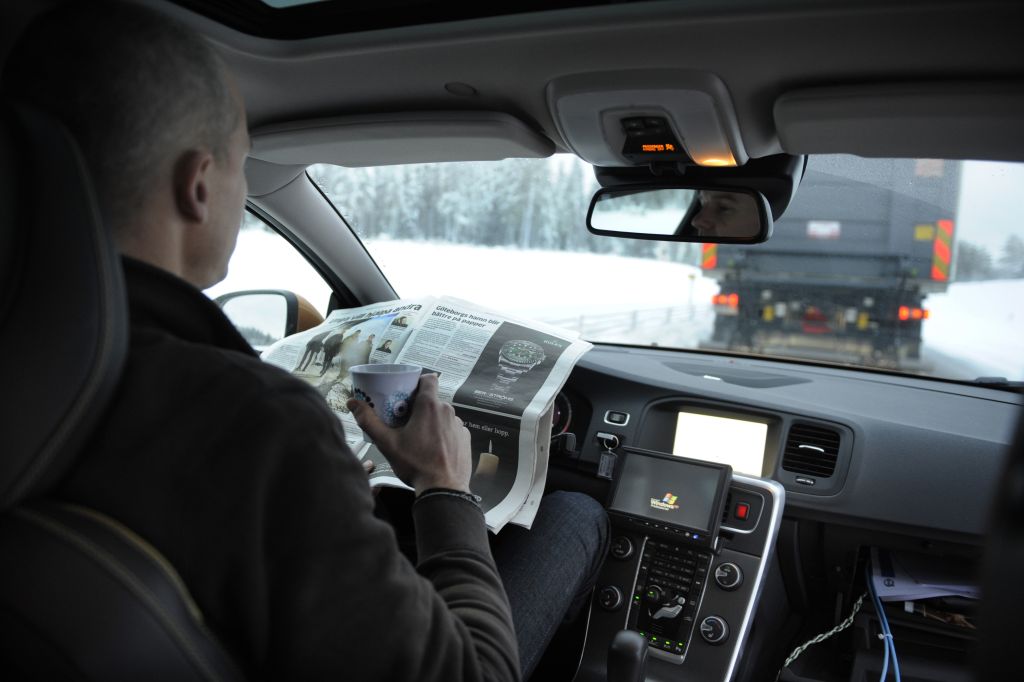Proposed rules for self-driving cars draw heavy criticism from industry leaders
 Hopes that California would emerge as the global center for what eventually could be a multitrillion-dollar industry — self-driving vehicles — have taken a step back.
Hopes that California would emerge as the global center for what eventually could be a multitrillion-dollar industry — self-driving vehicles — have taken a step back.
New proposed rules unveiled this month by the state’s Department of Motor Vehicles drew sharp complaints from the leading companies in the field — Google, General Motors, Ford, Volkswagen and Honda — as being far too onerous and certain to slow innovation. They are among 18 firms with licenses to test autonomous vehicles in California.
A nascent industry group — The Self-Driving Coalition for Safer Streets, whose members include Lyft, Uber Technologies and Volvo — released a statement that the rules “could greatly delay the benefits that self-driving vehicles can bring to safety and mobility for individuals.”
Among the proposed state rules spurring concern:
-
A regulation that would require a one-year delay between testing a vehicle with new technology and its use on public streets and highways.
-
A regulation that would require driverless vehicles being tested to have vehicle data recorders whose information is regularly provided to the DMV, which automakers fear could lead to proprietary information leaking out.
-
A regulation that allows police to demand that information from the vehicle data recorders be turned over within 24 hours without authorities having to get a subpoena or warrant.
-
A requirement that all local governments give their permission before an autonomous vehicle could be used on their roads and highways.
The last requirement drew a sharp response from Ron Medford, the director of safety for Google’s self-driving car project, who wondered why bureaucrats didn’t grasp how much red tape this would create. Medford said the rule was “unworkable,” according to a Reuters report.
Perhaps the only state action that was greeted warmly was regulatory language that suggested the DMV would be willing to accept testing of vehicles without steering wheels more quickly than expected.
Sharp contrast between state, federal approach
The state’s framework is based in many ways on ideas outlined in a federal proposal unveiled in September. That proposal generally won praise from autonomous automakers and from such tech websites as Ars Technica for heeding industry recommendations — especially in how to categorize levels of autonomy in vehicles being developed. Instead of using outdated language crafted by federal officials, the U.S. Department of Transportation adopted what are known as the SAE standards, which classify vehicles from 0 (totally human controlled) to 5 (totally automated).
But the reason the federal proposal won cheers while the California DMV’s plan won jeers is that the federal proposal amounts to a collection of guidelines, not hard rules. The Obama administration also underlined how important it considered autonomous vehicles to be in our future economy by having Jeffrey Zients, director of the National Economic Council, join Transportation Secretary Anthony Foxx at the news conference unveiling the rules. This was reflected in the headline on The New York Times coverage of the event: “Self-Driving Cars Gain Powerful Ally: The Government.”
The California state government sought to offer reassurance that its rules were drafts open to revision and that it wanted and welcomed input from the 18 companies testing autonomous vehicles in the state.
But the assurance didn’t come from Gov. Jerry Brown or one of his top aides. It came from Brian Soublet, deputy director of the California DMV, who said, “The goal is making sure that we can get this life-saving technology out on the streets.’
Chris Reed
Chris Reed is a regular contributor to Cal Watchdog. Reed is an editorial writer for U-T San Diego. Before joining the U-T in July 2005, he was the opinion-page columns editor and wrote the featured weekly Unspin column for The Orange County Register. Reed was on the national board of the Association of Opinion Page Editors from 2003-2005. From 2000 to 2005, Reed made more than 100 appearances as a featured news analyst on Los Angeles-area National Public Radio affiliate KPCC-FM. From 1990 to 1998, Reed was an editor, metro columnist and film critic at the Inland Valley Daily Bulletin in Ontario. Reed has a political science degree from the University of Hawaii (Hilo campus), where he edited the student newspaper, the Vulcan News, his senior year. He is on Twitter: @chrisreed99.
Related Articles
Are benefits of Prop 1 being oversold?
Proposition 1 — a $7.1 billion state bond to pay for a variety of water projects — was billed as
Picking mayors: When will L.A. voters be as smart as N.Y. voters?
Feb. 8, 2013 By Chris Reed Despite some pension reforms and program cuts, the city of Los Angeles remains in
Republicans Selling Out
John Seiler: As I expected, Gov. Jerry “Tax ‘Em Till They Drop” Brown is cadging enough Republican votes for his



